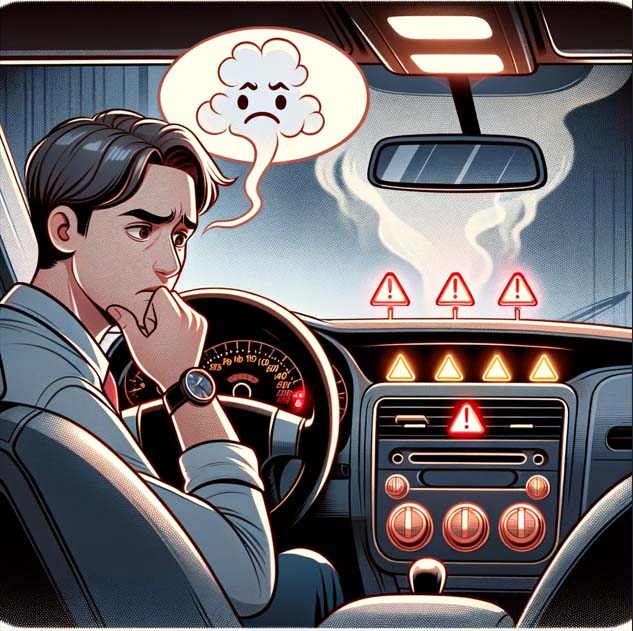Whether you’re a seasoned car enthusiast or rely on machinery for daily tasks, understanding why that acrid smell of burning oil wafts into your nostrils is crucial. From minor leaks to major malfunctions, deciphering the reasons behind this distinctive scent can save you from expensive repairs and unexpected breakdowns. So, buckle up as we dive deep into the world of burning oil odors, unravelling its mysteries and shedding light on what it signifies in various vehicular and mechanical contexts.
car smells of burning oil
The smell of burning oil can be noticeable in several contexts, particularly related to vehicles or machinery. Here’s a breakdown of the common reasons why you might smell burning oil and what it indicates:

Oil Leak onto the Exhaust System
If there’s an oil leak in your vehicle, and the oil drips onto hot parts of the exhaust system, it can produce a noticeable smell of burning oil. It is often accompanied by smoke and can be a sign that you need to check for leaks and repair them to prevent potential fire hazards and engine damage.
Overheated Engine
An overheated engine may produce a distinct smell of burning oil. It could be due to various issues, including low oil levels, a malfunctioning cooling system, or other mechanical failures. Regular maintenance and checking coolant and oil levels can help prevent this.
Worn-Out Components
Components like valve seals, piston rings, or gaskets, when worn out, can allow oil to seep into areas where it will burn, such as the combustion chamber. It smells of burning oil and can lead to decreased engine efficiency and increased emissions.
Spilt Oil
Spilling oil on the engine block during oil changes or top-ups can cause a smell of burning oil once the engine heats up. It usually resolves itself once the spilt oil burns off but can be prevented by cleaning any spills immediately after they occur.
Excessive Use of Vehicle
Pushing your vehicle hard for extended periods can lead to oil getting too hot and producing a smell of burning oil. It is a sign to let your engine cool down and use higher quality or more appropriate oil for your vehicle’s requirements.
If you notice a smell of burning oil, it’s essential to investigate the cause promptly. Ignoring it may lead to more serious mechanical issues, increased repair costs, and, in some cases, safety hazards. Regular maintenance and inspections are crucial to preventing and addressing the causes of burning oil smells.
How to get rid of burning oil smell in car
How to get rid of burning oil smell in your car involves addressing the underlying cause and removing the Odor from the Interior. Here’s a step-by-step guide to tackle both aspects:

Address the Underlying Cause of the smell of burning oil in car
1. Identify and Repair Leaks
Check for oil leaks in your engine. Familiar places to look include the valve cover gasket, oil pan gasket, and oil seals. Repairing these leaks may require replacing gaskets or seals.
2. Check for Overheating Issues
Ensure your cooling system works properly to prevent the engine from overheating and causing oil to burn. It may involve checking the radiator, thermostat, and coolant levels.
3. Clean Spilled Oil
If oil has spilt on the engine block or exhaust manifold during an oil change or due to a leak, clean it off carefully. You can use degreasers and a brush to remove oil from the surface.
4. Replace Worn Parts
If worn engine components like valve seals or piston rings are causing oil to burn within the combustion chamber, consider replacing these parts with a professional.
Remove the Odor from the Interior to eliminate burning oil smell in car.
1. Ventilate
Open all windows and doors to air out the Interior. You can also use the car’s ventilation system to help circulate the air.
2. Use Odor absorbers
Place odor absorbers such as activated charcoal, baking soda, or coffee grounds in the car. These materials can help absorb smells over time. Please leave them in the car for a few days for best results.
3. Clean the Interior
Thoroughly clean the Interior of your car, including carpets, upholstery, and air vents. You can use a mixture of water and vinegar or a specialized car interior cleaner. It helps remove any oil residues that may have entered the Interior and started to emit Odors.
4. Use Air Fresheners
After cleaning, you can use air fresheners to help mask any lingering Odors. Choose a mild scent to avoid overwhelming the car’s Interior.
5. Change the Cabin Air Filter
If your car has a cabin air filter, replace it. A dirty or saturated filter can hold onto Odors and circulate them within the vehicle.
6. Professional Cleaning
Consider getting a professional detailing service if the smell persists. Professional service can deep clean the Interior and use ozone generators or other specialized equipment to neutralize Odors.
Remember, the most crucial.
The first step in getting rid of the burning oil smell in a car is to address the mechanical issues causing the smell. Failure to do so can lead to more severe problems down the line. Regular maintenance and prompt attention to any signs of leaks or overheating can help prevent recurring issues.
conclusion
In conclusion, the smell of burning oil is typical and can arise from various sources, such as engine leaks, worn-out gaskets, or overheated components. It serves as a valuable indicator of potential issues within vehicles or machinery that should be addressed. Identifying and promptly addressing the source of the smell can help prevent more severe problems and ensure the proper functioning and longevity of your equipment. Remember, if you notice the odor of burning oil, it’s essential to investigate and address the issue promptly to avoid costly repairs or safety hazards. Stay vigilant and proactive in maintaining your vehicles and machinery to keep them running smoothly.

